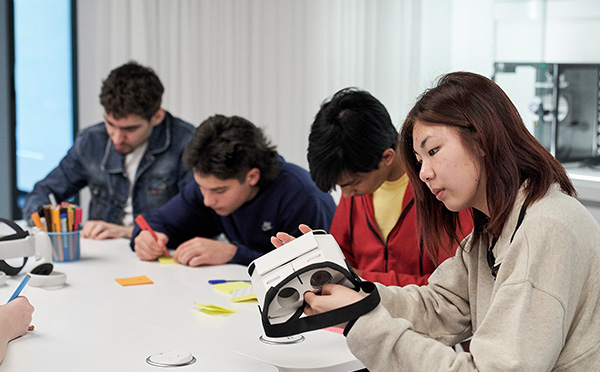Virtual Reality Project Advisors
become a youth advisor for our virtual reality projects

Are you interested in how virtual reality and digital interventions could be used to support young people recovering from and living with psychosis?
We're looking for young people who’ve received support from early psychosis services and who have challenges with social situations. We want your help to develop and design new virtual reality (VR) environments to be used in Orygen Digital studies.
To apply, review the following role and eligibility requirements and complete the submission form at the bottom of this page.
What's the opportunity?
Orygen Digital needs a team of youth advisors (ages 16 to 35) who have experiences of early psychosis as well as challenges in social situations so that we can better support the social recovery of young people after experiencing psychosis.
As a youth advisor, you'll use your lived experience to help us develop VR content and provide your opinion on key design aspects of VR studies.
We'd like a broad representation of young people with lived experience of different types of social difficulties, experiences of psychosis and/or being considered ultra-high risk for psychosis. This lived experience could include, for example, having difficulty recognising other people's emotions or intentions in social situations. Or being distracted or scared by hallucinations during social situations.
This can be something you've experienced recently or in the past.
Your help will make the project as inclusive, functional, engaging and user-friendly as possible.
WHAT's INVOLVED?
Youth advisors will be invited to participate in our projects based on your preferences, eligibility and location.
Ways you can participate include:
- 2 x online group workshops with other youth advisors and up to 2 x one-on-one consultations OR 3 one-on-one consultations
- 3 x user-testing sessions of a virtual reality intervention at Orygen Parkville (for those living in or around Melbourne).
The workshops or consultations run for two hours and will happen over Zoom. You will be reimbursed $30 per hour of engagement.
User-testing sessions will happen in person at Parkville in Melbourne. You will be reimbursed $30 per hour of engagement and for travel to and from the session.
Online workshops will start in mid-March through to April 2024. Once we’ve confirmed your involvement, the group facilitator will work with you to confirm your availability.
As a youth advisor in this project, you might be expected to:
- Discuss (broadly) your experiences of social recovery or symptoms of psychosis or hallucinations
- Voice your opinion about the design, features and functions of the virtual reality tool
- Collaborate with group members in activities (if participating in workshops).
In your role, there might be times where you feel it would be useful to share your lived experience of mental health, however this is entirely up to you and there is no pressure for you to do so. Anything shared during workshops, consultations or via email with the project team will not be shared outside of the team without your consent.
WHAT SUPPORTS WILL I HAVE ACCESS TO?
Ensuring that you feel comfortable and supported for the duration of the project is of high priority. The group facilitator will work with you to develop a wellbeing plan for your involvement in this project, which will outline the things we need to be aware of to support your safety and wellbeing. This will include who you and the project team can contact if additional support is needed.
The project team has researchers, clinicians and technology developers from Orygen and the University of Melbourne. The workshops will be run by Shona Louis and Jordan Thorpe from the peer research team, supported by the project lead, Roos Pot-Kolder.
AM I ELIGIBLE?
We're looking for people who:
- are aged 16 to 35 years;
- are based in Australia;
- have received support from an early psychosis service
- have experienced psychosis or sub-clinical symptoms of psychosis (such as delusions or hallucinations), as well as difficulties in social situations;
- are passionate about technologies like virtual reality.
Making this project accessible to all young Australians is of high priority to the project team. We strongly welcome and encourage applications from Aboriginal and Torres Strait Islander young people, young people from the LGBTQIA+ communities, young people from culturally and linguistically diverse backgrounds, and young people with a disability.
How can I get involved?
If you’re interested in being a youth advisor and contributing to our project, please complete the following form ASAP and we'll be in touch.
QUESTIONS
If you have further questions about the role or project, get in touch with the group facilitator, Shona Louis, or project lead, Rose Pot-Kolder:
Shona Louis, Senior Peer Researcher. Pronouns: she/her/hers. Email: [email protected]
Rose Pot-Kolder, Research Fellow. Pronouns: she/her/hers. Email: [email protected]